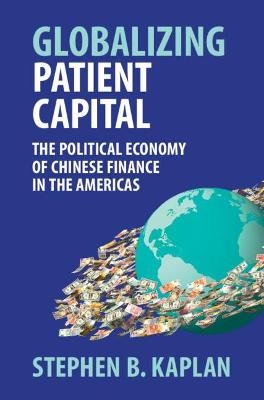
Globalizing Patient Capital
The Political Economy of Chinese Finance in the Americas
Seiten
2021
Cambridge University Press (Verlag)
978-1-107-18231-8 (ISBN)
Cambridge University Press (Verlag)
978-1-107-18231-8 (ISBN)
This book is for scholars and practitioners examining the costs and benefits of China's economic expansion into the Western Hemisphere. It assesses how China's state-led capitalism, a form of 'patient capital' characterized by long-term risk tolerance and a lack of policy conditionality, affects national-level governance across the Americas.
China's overseas financing is a distinct form of patient capital that marshals the country's vast domestic resources to create commercial opportunities internationally. Its long-term risk tolerance and lack of policy conditionality has allowed developing economies to sidestep the fiscal austerity tendencies of Western markets and multilaterals. Employing statistical tests and extensive field research across China and Latin America, Stephen Kaplan finds that China's patient capital endows national governments with more room to maneuver in formulating domestic policies. The author goes on to evaluate the potential costs of Chinese financing, raising the question of how Chinese lenders will react to developing nation's ongoing struggles with debt and dependency. By disaggregating the structure of international finance, Globalizing Patient Capital has significant implications for the rise of China in Latin America, offering new insights about globalization and showing the costs and benefits of state versus market approaches to development.
China's overseas financing is a distinct form of patient capital that marshals the country's vast domestic resources to create commercial opportunities internationally. Its long-term risk tolerance and lack of policy conditionality has allowed developing economies to sidestep the fiscal austerity tendencies of Western markets and multilaterals. Employing statistical tests and extensive field research across China and Latin America, Stephen Kaplan finds that China's patient capital endows national governments with more room to maneuver in formulating domestic policies. The author goes on to evaluate the potential costs of Chinese financing, raising the question of how Chinese lenders will react to developing nation's ongoing struggles with debt and dependency. By disaggregating the structure of international finance, Globalizing Patient Capital has significant implications for the rise of China in Latin America, offering new insights about globalization and showing the costs and benefits of state versus market approaches to development.
Stephen B. Kaplan is Associate Professor of Political Science and International Affairs at George Washington University. He is the author of Globalization and Austerity Politics in Latin America (Cambridge, 2013).
1. Introduction: China's Latin American Bankers; 2. The Emergence of Chinese Patient Capital; 3. Globalizing Patient Capital: A Theoretical Framework; 4. The Political Economy of Chinese Finance; 5. Chinese Financing and Latin American Fiscal Space; 6. Public Procurement's Check on Fiscal Expansion; 7. International Loans with Commercial Strings Attached; 8. Conclusion: A Dynamic Creditor-Debtor Relationship.
| Erscheinungsdatum | 07.03.2022 |
|---|---|
| Zusatzinfo | Worked examples or Exercises |
| Verlagsort | Cambridge |
| Sprache | englisch |
| Maße | 157 x 235 mm |
| Gewicht | 720 g |
| Themenwelt | Wirtschaft ► Volkswirtschaftslehre ► Wirtschaftspolitik |
| ISBN-10 | 1-107-18231-X / 110718231X |
| ISBN-13 | 978-1-107-18231-8 / 9781107182318 |
| Zustand | Neuware |
| Haben Sie eine Frage zum Produkt? |
Mehr entdecken
aus dem Bereich
aus dem Bereich
ausgehandelt? – wie offen ist die Weltgesellschaft?
Buch | Softcover (2024)
UTB (Verlag)
CHF 30,80
Theorie und Anwendung
Buch | Hardcover (2024)
Vahlen, Franz (Verlag)
CHF 55,70
wie sich unsere Wirtschaftspolitik ändern muss, damit wir globale …
Buch | Hardcover (2024)
Wiley-VCH (Verlag)
CHF 55,95


